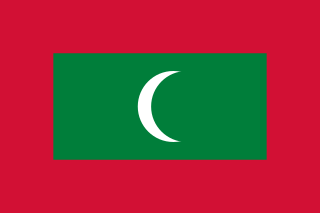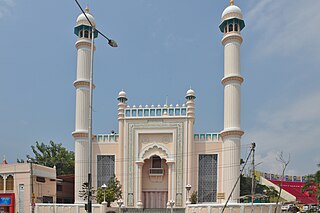Related Research Articles
Zayd ibn ʿAlī, also spelled Zaid, was the son of Ali ibn al-Husayn Zayn al-Abidin, and great-grandson of Ali ibn Abi Talib. He led an unsuccessful revolt against the Umayyad Caliphate, in which he died. The event gave rise to the Zaydiyya sect of Shia Islam, which holds him as the next Imam after his father Ali ibn al-Husayn Zayn al-Abidin. Zayd ibn Ali is also seen as a major religious figure by many Sunnis and was supported by the prominent Sunni jurist, Abu Hanifa, who issued a fatwa in support of Zayd against the Umayyads.

The Maldives competed at the 2004 Summer Olympics in Athens, Greece, from 13 to 29 August 2004. The delegation's participation in the Athens Olympics marked the Maldives' fifth appearance at the Summer Olympics since their debut at the 1988 Summer Olympics in Seoul, South Korea. Four athletes competed across two sports; Sultan Saeed and Shifana Ali in track and field, and Hassan Mubah and Aminath Rouya Hussain in swimming. None of the track or swimming athletes advanced past the first round in their events, and no Maldivian has won a medal in any events. Sultan Saeed bore the Maldives' flag during the parade of nations of the opening ceremony.

Saudi Arabia competed at the 1984 Summer Olympics in Los Angeles, United States. The nation returned to the Olympic Games after participating in the American-led boycott of the 1980 Summer Olympics. 37 competitors, all men, took part in 11 events in 5 sports.

In Islam, irfan, literally 'knowledge, awareness, wisdom', is a concept in Islamic mysticism akin to gnosis, or spiritual knowledge.

Djibouti took part in the 1988 Summer Olympics which were held in Seoul, South Korea from September 17 to October 2. The country's participation marked its second appearance in the Summer Olympics since its debut at the 1984 Summer games in Los Angeles, United States. The delegation from Djibouti included six athletes, five in athletics and one in sailing. The five athletes for athletics were Hoche Yaya Aden, Ismael Hassan, Talal Omar Abdillahi, Hussein Ahmed Salah, and Omar Moussa while Robleh Ali Adou represented the nation in sailing. Ahmed Salah won the nation's first Olympic medal, which is a bronze at the Men's Marathon event.

Egypt competed at the 1952 Summer Olympics in Helsinki, Finland. 106 competitors, all men, took part in 65 events in 14 sports.
In Shia Islam, Qāʾim Āl Muḥammad is an epithet for the Mahdi, the eschatological figure in Islam who is widely believed to restore the religion and justice in the end of time. The term was used as early as the eighth century to refer to a future member of the family of the Islamic prophet Muḥammad who would rise against tyranny in the end of time and restore justice. This term was already common by the end of the Umayyad caliphate and largely replaced the term Mahdi in Shia literature. The term was often qualified as al-Qa'im bi 'l-sayf or al-Qa'im bi-amr Allah.

Egypt and Syria, as the United Arab Republic, competed at the 1960 Summer Olympics in Rome, Italy. Syria was a constituent of the United Arab Republic in 1960, but almost all 74 competitors for the Olympic team were from Egypt. 74 competitors, all men, took part in 34 events in 12 sports.

Qatar competed at the 1996 Summer Olympics in Atlanta, United States.
Ahmed Alhasan is an Iraqi Shia Muslim religious leader. He has been called the most prominent of figures claiming to be the messianic al-Yamani, in the chaos following the US invasion of Iraq in 2003. In Twelver Shi'ism Islam, the majority religion of Iraq, al-Yamani is "the deputy of the Mahdi, the Twelfth Imam, and a precursor to his Reappearance" and to End Times.
Hassan or Hasan is an Arabic masculine given name in the Muslim world.

Djibouti first participated at the Olympic Games in 1984, and have competed in every Summer Olympic Games, apart from the 2004 edition, since then. They have never competed in the Winter Olympic Games.

Masjid-i Jahān-Numā, commonly known as the Palayam Juma Masjid of Thiruvananthapuram, is the principal mosque of Thiruvananthapuram in Kerala, India. It is a Jama Masjid.
The Dukayniyya Shia were a sect of the Zaidi branch of Shia Islam. The Dukayniyya Shia were led by Abu Nu'aym al-Fadl ibn al-Dukayn and Ibrahim ibn al-Hakam.
Uyoun Akhbar Al-Ridha, counted as a Hadith book among Shia, the book was written by Ibn Babawayh, one of the great scholars of Shia Muslims. The book concerned with saying and life of the eighth Shia Imam Ali al-Ridha.
Hassan Kadhim Ali is an Iraqi former hurdler who competed in the 1980 Summer Olympics.

Ayatallah Aqa Syed Ahmed Rizvi, or Razavi, was a Shiite Islamic jurist, religious reformer, and scholar who lived in Srinagar, Kashmir.
Hassan Ali Allouba was an Egyptian footballer. He competed in the men's tournament at the 1920 Summer Olympics.
Kamal Ali Hassan was an Egyptian former diver. He competed at the 1952 Summer Olympics.
Abū ʿAlī Ḥasan, or ʿAlī, surnamed Al-Hādī was the 20th Ismaili Nizari Imam. Born in Cairo, he was about 17 years old when his predecessor, Imam al-Mustansir, died, and 20 years old during the assumption of his Imamate in 490 AH/1097 CE. Henceforward, the seat of Ismaili Imamate was transferred from Egypt to Persia owing to the division among the Ismailis, where Hasan bin Sabbah had founded the Nizari Ismaili state.
References
- ↑ Evans, Hilary; Gjerde, Arild; Heijmans, Jeroen; Mallon, Bill; et al. "Imam Hassan Ali Olympic Results". Olympics at Sports-Reference.com. Sports Reference LLC. Archived from the original on 18 April 2020. Retrieved 21 February 2019.